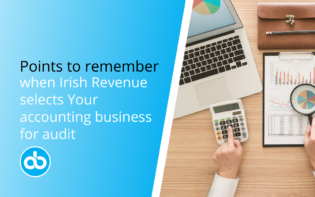
In addition to all the other associated tasks, the general ledger, sub-ledgers for related accounts, and other numerical information must be managed. You need to get it in order before your financial well-being is ruined by disorganised bookkeeping.
However, confusion extends beyond financial stability. Without efficient bookkeeping practices, crucial financial information for future company choices could be lost. The good news is that keeping track of your finances is not a difficult task. Accurate financial reporting is possible with the proper bookkeeping methods.
Let’s explore more about efficient bookkeeping practices in compliance with Irish tax laws. Get started to learn more!
What is Bookkeeping?
Keeping accurate financial records requires an organised and regular approach to recording, classifying, and structuring financial transactions. This includes keeping tabs on all the company’s financial transactions. Revenue from sales, purchases, receipts, and salaries all fall under this category.
But does bookkeeping differ for small businesses? The execution of small business bookkeeping varies from those of large companies. When starting with a smaller team, it’s not uncommon for the business owner to handle the bookkeeping tasks individually. Small businesses can find this particularly difficult if they don’t have experience with bookkeeping.
A general ledger, accounts payable/receivable, and a trial balance are all components of an accounting system necessary for recording these financial transactions. Bookkeeping is more than keeping track of money coming in and going out. It also includes tasks like balancing bank accounts, creating reports, and evaluating data.

Top Tips for Efficient Bookkeeping Practices
Here are the top tips for efficient bookkeeping practices that help you maintain your company’s financial records:
Maintain Your Finances Separately
Separating your personal and business finances can avoid cash flow issues. Never do business using personal funds or buy anything for yourself using business funds. You run the risk of mixing your personal and business funds when you run a small company that handles all the transactions.
Although you can be the only one dealing with the money, keeping the different types of funds separate is still a good idea. Open separate bank accounts to make tax time a breeze and clearly understand your company’s financial conditions.
Choose Your Accounting Approach
Your business could use accrual or cash-based accounting as a conventional method of accounting. However, companies that primarily deal in cash for offerings will most likely use cash accounting. This is because transactions involving cash are recorded at the moment that money is exchanged.
Revenues and costs are recorded when they are incurred using the matching principle in the accrual approach, regardless of when payments are paid or received. Thus, the accrual method is usually the most excellent choice for any business that invoices clients, even though it could be slightly more complicated.
Alternatively, you can use a modified cash basis, a hybrid of the two accounting approaches. Operating on cash, except for paying bills and creating accounts receivable, is a modified cash basis. You must choose the right system for your business before making your first transaction.
Keep Tabs on Your Financial Transactions
As a small business owner, you care about the big picture and the details of your company’s financial activities. Based on previous data, you need to classify your income and expenses to find areas of strength or development. Therefore, looking at these improvements from a bird’s eye perspective every so often is a good idea.
Comprehensive accounting software makes it simple to monitor one-time and recurring expenses. However, many small businesses still use traditional accounting methods like paper ledgers or Excel spreadsheets. Choosing efficient software that suits your unique needs is crucial.
With invoicing software, tracking your incoming and outgoing transactions will be a breeze. These technologies can also save time by automating your continuing costs and income.
Choosing the Right Accounting Software
You should keep meticulous records of all your company expenses. To do this, you must record all receipts every week. Using reliable accounting software or cloud-based technologies will make your tasks easier.
Before choosing accounting software, consider whether it can meet your current bookkeeping needs. You should also consider how well each technology can adapt to your changing business needs.
Keep a Close Eye on AP and AR
One of the most important aspects of good bookkeeping is monitoring accounts payable and receivables. Keep your accounts payable and receivable in good standing to maximise your available money. If you monitor your accounts payable to ensure you pay your creditors accurately, you can avoid late penalties or earn rewards by paying early.
Also, by keeping track of your accounts receivable, you can better manage your invoices with timely payments. It involves being prompt in sending invoices to follow up on overdue accounts.
Always Review Your Bank Statements
You should balance your bank statements regularly, check your transactions daily, and address any issues you find immediately. Verifying this using a bank statement reconciliation will indicate that your current assets match your current liabilities. If they aren’t compatible, it’s clear that they require fixing.
By carefully reviewing your bank records regularly, you can help identify fraud or errors and monitor your cash flow.
Assign Internal Control Authorities
It would be easy for fraudsters to access your books. Therefore, internal controls should be implemented to reduce the possibility of fraud. It is common practice in bookkeeping to break down your responsibilities into three primary areas. Ensure that no employee can access assets, records, and authorisation simultaneously.
You can have one employee handle the check drafting, another handle the bank account reconciliation, and one handle payment processing. Outsourcing to a reliable partner like Outbooks is an excellent option for keeping your small business bookkeeping efficient.
According to the studies, around 37% of small businesses use outsourcing services for their accounting needs.
The Final Thoughts
Good bookkeeping is the secret to success if you own a small business in Ireland. Having efficient bookkeeping practices is crucial to protecting your company from needless loss. Do you need assistance with day-to-day bookkeeping for your small business? Reach out to the experts at Outbooks today!
At Outbooks, we provide tailored solutions by knowing your business needs. Our services are accessible and scaled to meet your firm’s growing needs.
Get in touch with Outbooks for reliable bookkeeping services at info@outbooks.com or +44 330 057 8597 today!










